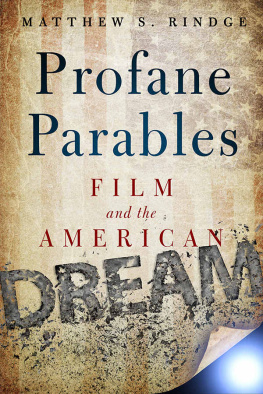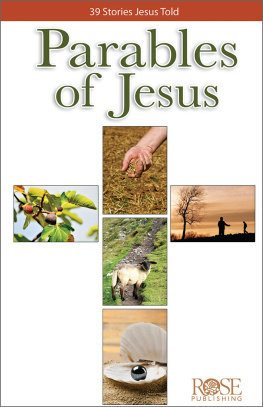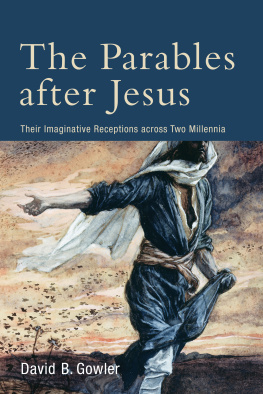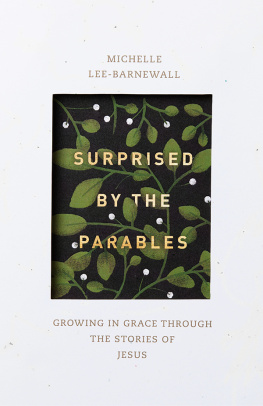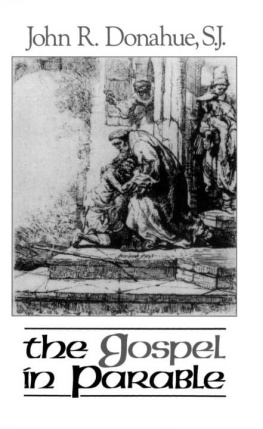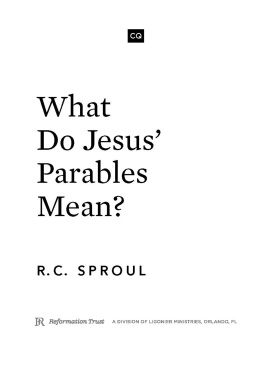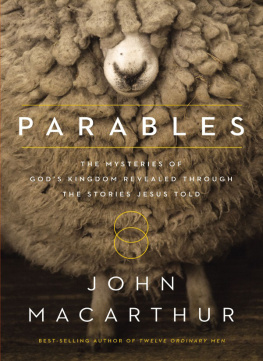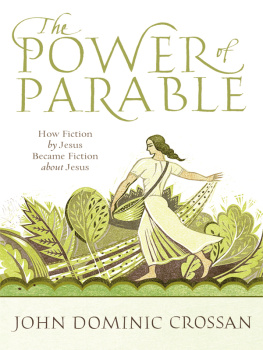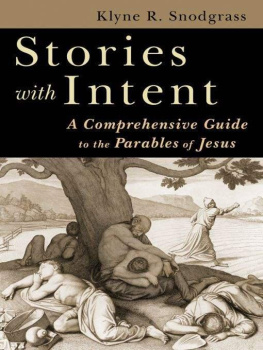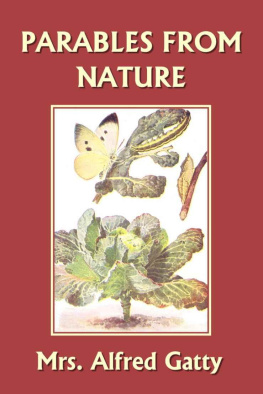Matthew S. Rindge - Profane Parables
Here you can read online Matthew S. Rindge - Profane Parables full text of the book (entire story) in english for free. Download pdf and epub, get meaning, cover and reviews about this ebook. year: 2016, publisher: Baylor University Press, genre: Religion. Description of the work, (preface) as well as reviews are available. Best literature library LitArk.com created for fans of good reading and offers a wide selection of genres:
Romance novel
Science fiction
Adventure
Detective
Science
History
Home and family
Prose
Art
Politics
Computer
Non-fiction
Religion
Business
Children
Humor
Choose a favorite category and find really read worthwhile books. Enjoy immersion in the world of imagination, feel the emotions of the characters or learn something new for yourself, make an fascinating discovery.
- Book:Profane Parables
- Author:
- Publisher:Baylor University Press
- Genre:
- Year:2016
- Rating:5 / 5
- Favourites:Add to favourites
- Your mark:
- 100
- 1
- 2
- 3
- 4
- 5
Profane Parables: summary, description and annotation
We offer to read an annotation, description, summary or preface (depends on what the author of the book "Profane Parables" wrote himself). If you haven't found the necessary information about the book — write in the comments, we will try to find it.
Profane Parables — read online for free the complete book (whole text) full work
Below is the text of the book, divided by pages. System saving the place of the last page read, allows you to conveniently read the book "Profane Parables" online for free, without having to search again every time where you left off. Put a bookmark, and you can go to the page where you finished reading at any time.
Font size:
Interval:
Bookmark:
Matthew S. Rindge
Baylor University Press
2016 by Baylor University Press
Waco, Texas 76798
All Rights Reserved. No part of this publication may be reproduced, stored in a retrieval system, or transmitted, in any form or by any means, electronic, mechanical, photocopying, recording or otherwise, without the prior permission in writing of Baylor University Press.
Cover Design by the author. Cover Layout by theBookDesigners.
Cover image: Courtesy of Shutterstock
978-1-4813-0587-7 (Kindle)
978-1-4813-0586-0 (ePub)
This ebook was converted from the original source file. Readers who encounter any issues with formatting, text, linking, or readability are encouraged to notify the publisher at BUP_Production@baylor.edu. Some font characters may not display on all ereaders.
To inquire about permission to use selections from this text, please contact Baylor University Press, One Bear Place, #97363, Waco, Texas 76798.
Library of Congress Cataloging-in-Publication Data
Rindge, Matthew S., author.
Profane parables : film and the American dream / Matthew S. Rindge.
191 pages cm
Includes bibliographical references and index.
ISBN 978-1-4813-0429-0 (hardback : alk. paper)
1. Motion picturesReligious aspectsChristianity. 2. Motion picturesUnited States. 3. American DreamReligious aspectsChristianity. 4. Fight club (Motion picture) 5. American beauty (Motion picture) 6. About Schmidt (Motion picture) I. Title.
PN1995.5.R56 2016
791.43682dc23
2015026592
Ce nest rien de mourir; cest affreux de ne pas vivre.
-Victor Hugo, Les Misrables
For Shannon, Andrew, and Sophia.
May we live before we die.
My love affair with film began in 1978, when my dad took a five-year-old boy to see a rerelease of Pinocchio in southern California. It was my first time in a theater; I was transfixed and instantly hooked. Disney was my gateway drug. I thank my dad, my original dealer, for providing the first hit.
Many people have shaped my understanding of Religion/Theology and Film, and deepened my love for the subject. I am indebted to Robert Johnston, Craig Detweiler, and Gary Laderman for encouraging my interest in this field, and my work on this specific project. As a student at Fuller Theological Seminary, I learned invaluable lessons from Rob, and I continue to do so from his writing. His influence is evident throughout these pages. Working as a teaching assistant with Craig was a delight, and instructive about how to teach well. This books initial shape emerged in a seminar I took with Gary in the Graduate Division of Religion at Emory University. Coteaching with him allowed me to explore some of these initial ideas with students.
Since 2009 I have taught a Bible and Film course every semester at Gonzaga University. A segment of this course addresses cinematic critiques of the American Dream, and considerable material in this book had its origins in different iterations of this course. I thank Gonzaga Religious Studies department colleagues for supporting my creation of this course, and its ongoing development. I am grateful to be able to teach material I know and love. Conversations about cinema with colleagues Ron Large, Patrick McCormick, and Kevin McCruden are fun and informative. Students in this course offer insights that have helped sharpen this book.
When I first shared my vision for Profane Parables with editors Carey Newman and Nicole Murphy in Atlanta, they expressed genuine interest and enthusiasm in the project. Carey has since then been an indefatigable and careful editor, closely reading my insomnia cures, and encouraging me to transform them into compelling prose. Readers owe him a debt, for the book is much improved as a result of his involvement. I thank Carey and the many other Baylor University Press staff for enabling my vision to materialize in concrete form. I thank Jordan Rowan Fannin, who was especially helpful with permissions issues, and Cade Jarrell, whose copyediting of the entire manuscript was meticulous and thoughtful.
Readers of various chapters have been more than generous with constructive feedback. I thank Adele Reinhartz, Richard Walsh, Kent Brintnall, Robert Johnston, Michael Kates, and Shannon Rindge for their insights, questions, and critiques. The anonymous external reviewers of the manuscript provided supportive and helpful suggestions.
The Bible and Film section in the Society of Biblical Literature has been an academic home of sorts for me during the last several years. Jeffrey Staley and Richard Walsh warmly welcomed me into this coterie and extended collegial hospitality. Rhonda Burnette-Bletsch and Lloyd Baugh have encouraged my academic work. Robert Seesengood, Laura Copier, and Caroline Vander Stichele have offered insightful feedback, and I have learned much from their own work. I have presented some of this material at SBL annual meetings in San Francisco (2011), Chicago (2012), and Baltimore (2013). Deans Elisabeth Mermann-Jozwiak and Patrick Burke invited me to present some of these ideas at the Gonzaga-in-Florence Capacity for Renaissance conference in Firenze, Italia (2014). I thank John Carroll for inviting me to write an article on Lukes parables for Interpretation, and discuss the same subject in a Gospel of Luke section at the SBL annual meeting in San Diego (2014). Material from that article and address has been adopted for use here.
A few people were kind enough to grant me permission to include their fine work in this project. I thank Alexander Payne for letting me use so much dialogue from his film About Schmidt; Steve Pope for letting me use a political cartoon from the late Mike Ritter; and Robert M. Johnston for allowing me to use his translation of two rabbinic parables.
Many churches and other organizations have invited me to share some of the ideas in this book. I thank Central Presbyterian Church (Atlanta, Georgia), St. Joseph Parish (both in Colbert, Washington and Otis Orchards, Washington), and in Spokane, Washington: First Presbyterian Church, Spiritus (the Episcopalian diocesan center for spirituality), and Jewish Family Services.
Much of this book was written in three superb coffee shops in Spokane. I thank the owners and baristas at Revel 77, Indaba, and Coeur for providing hospitable service, stellar coffee, and patiently tolerating this pesky author. Manito Tap House, another writing site, offers exceptional beer and gracious service. I finished editing the book during a seven week stay in Firenze, Italia, and I remain grateful for the warmth and kindness of this citys residents.
Shannon, Andrew, and Sophia enrich my life in countless ways. Their presence is a recurring and luxurious grace. I count myself luckyand am gratefulto be in their family. With deep love, I dedicate this book to them. We have been gifted by cinematic artists with occasional sacred encounters. I wish these would continue forever. Jorge Luis Borges once imagined that Paradise will be a kind of library. If he is right, and we ever find such a place, I hope it offers film screenings as well as books.
Jorge Luis Borges, Blindness, in Seven Nights (trans. Eliot Weinberger; New York: New Directions Books, 1984), 110.
In the posteverything world it turns out humans cant kick the story habit. Homer gets the last laugh.
Glen Duncan
We are lonesome animals. We spend our lives trying to be less lonesome. One of our ancient methods is to tell a story begging the listener to sayand to feelYes, thats the way it is, or at least thats the way I feel it. Youre not as alone as you thought.
Font size:
Interval:
Bookmark:
Similar books «Profane Parables»
Look at similar books to Profane Parables. We have selected literature similar in name and meaning in the hope of providing readers with more options to find new, interesting, not yet read works.
Discussion, reviews of the book Profane Parables and just readers' own opinions. Leave your comments, write what you think about the work, its meaning or the main characters. Specify what exactly you liked and what you didn't like, and why you think so.

